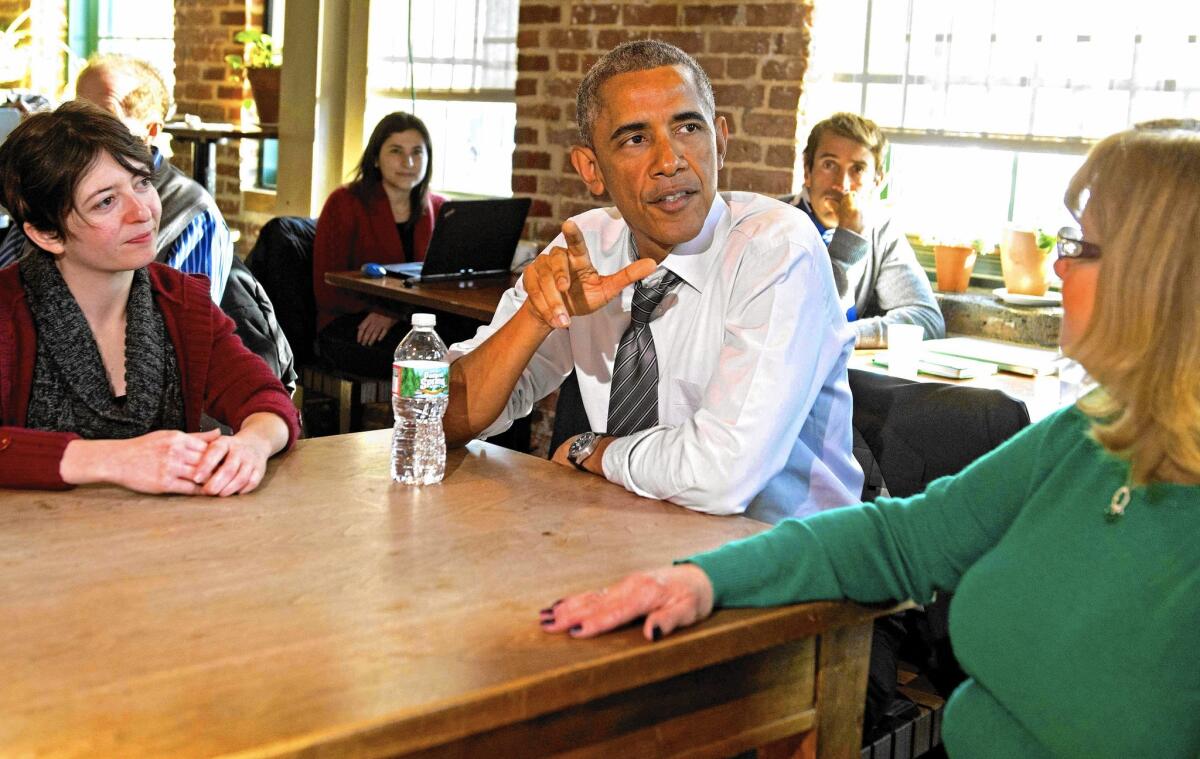Obama pushes paid sick/family leave for workers

- Share via
Reporting from baltimore — President Obama embarked on an effort Thursday to make paid family leave the new norm in America, using a strategy that garnered him some success last year in increasing the minimum wage for certain workers.
Obama signed an order to give up to six weeks of paid leave to all federal employees when a new child arrives and publicly called on Congress to pass a federal law guaranteeing seven days of paid sick leave for all Americans.
He also announced that Department of Labor money would be made available for states and cities that want to study implementing their own such policies.
Then, after a lunchtime meeting with coffee shop owners and working parents in Baltimore, Obama unveiled a pitch to corporate America: Paid family leave is good for companies’ bottom lines.
“When they make that investment in their employees, there’s a dividend,” Obama told reporters at Charmington’s cafe. “They end up being more profitable over the long term.”
The president’s approach to paid leave draws heavily on his experience over the last year with the minimum wage, a proposal he rolled out in the State of the Union address last January by asking Congress to raise workers’ base pay to $10.10 an hour from $7.25. His first steps were to sign an executive order raising the wage for people working on federal contracts and to set off on a speaking tour to plug the idea.
Today, Obama has yet to persuade the Republican-led Congress to hike the wage. But the idea has picked up currency: 17 states and the District of Columbia have raised the requirement to increase the pay of an estimated 7 million workers.
One Obama aide called the momentum “heartening,” and the president’s team is embracing the strategy as one of the best tools at his disposal as advisors prepare to reuse it for paid leave.
Still, the newest sales pitch faces the same challenges as the one for minimum wage. Republicans scoff at the idea of imposing more costly requirements, especially on small businesses.
Americans already have “great freedom” when it comes to work, said Sen. Lamar Alexander (R-Tenn.), noting that workers have latitude to choose a career and negotiate for the benefits that matter most to them. American businesses operate with far fewer restrictions than the rest of the world, he said.
“One more government mandate, however well-intentioned, will only reduce those freedoms, making it harder for employees to find jobs, negotiate for the things they need and open and run businesses,” he said.
House Republicans are offering an alternative that would relax labor laws that require businesses to give premium pay for overtime work, rather than, say, compensatory time off. Backers of the bill said working parents would like the flexibility to take time off instead of money.
But the White House is trying to convince a much bigger audience than just Republicans in Congress. Obama’s economic team argues that family-friendly policies are good for business because they cut worker turnover, encourage higher productivity and boost investors’ perceptions of the value of a firm.
The White House cites several studies to support its argument, including one analysis of more than 700 firms that found that companies with work-life balance policies saw higher productivity from employees.
A survey of employers in New York found that flexible leave policies helped businesses’ bottom lines by reducing worker turnover, according to Betsey Stevenson, an economic advisor to the president. Family-friendly policies have even been shown to boost corporate profits, she said.
One reason for the boost might be that if workers know they can schedule paid leave to care for themselves or for family, it reduces distraction while they are on the job, said Mary Eschelbach Hansen, an economist at American University.
Studies of the unpaid leave provided by the Family and Medical Leave Act of 1993 show that when employees take time off to care for a sick family member, it speeds the relative’s recovery time, she said.
“These types of benefits could pay for themselves through increased productivity and lower wages,” Hansen said. “The focus of the White House announcements today is clearly on the benefits to firms through increased productivity.”
Cities with paid sick leave, including San Francisco, saw no negative economic effect of adopting such a law, she said. Compared with nearby cities that did not have paid leave, she said, employment in a number of businesses in San Francisco went up after the law’s implementation.
Obama is asking Congress and state and local officials to approve legislation allowing millions of working Americans to earn up to seven days of paid sick time per year.
He is asking for $2 billion in new funds to encourage states to develop paid family and medical leave programs. By his authority, the Department of Labor will begin to use $1 million in existing funds to help states and municipalities run studies with an eye to setting up their own paid family leave policies.
He directed federal agencies to advance up to six weeks of paid leave for parents with a new child, drawing on their future accrual of sick time. Obama also is asking Congress to pass legislation giving federal employees an additional six weeks of paid parental leave, presumably to be used instead of future sick time.
For his kickoff announcement, Obama chose Charmington’s, a sunny cafe filled with the scent of fair-trade coffee. Charmington’s gives its employees paid leave when they’re sick, according to one of the co-owners, and the business runs better for it.
No one wants to come to a restaurant with sick employees, said the co-owner, Adrienne Kinsey.
“We can provide a better cafe and a better work environment if people can take off when they’re sick,” Kinsey said. “It’s better for employees and customers too.”
More to Read
Inside the business of entertainment
The Wide Shot brings you news, analysis and insights on everything from streaming wars to production — and what it all means for the future.
You may occasionally receive promotional content from the Los Angeles Times.











